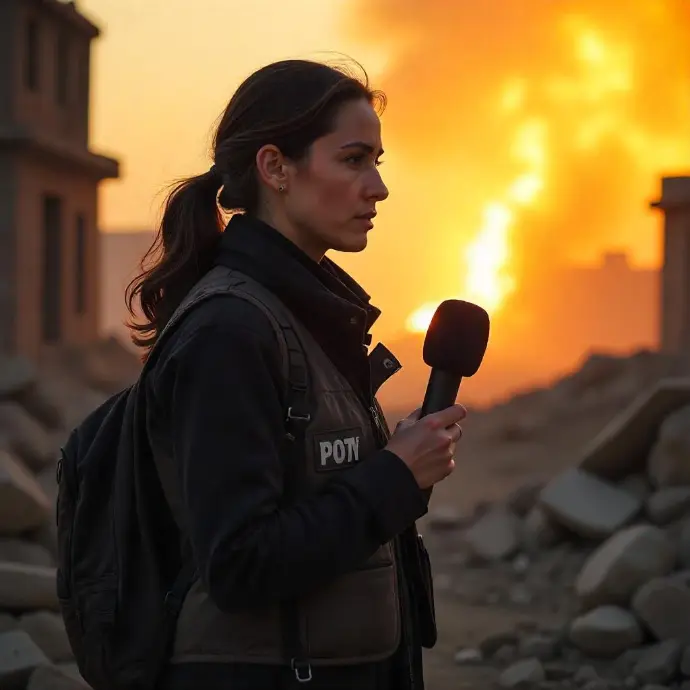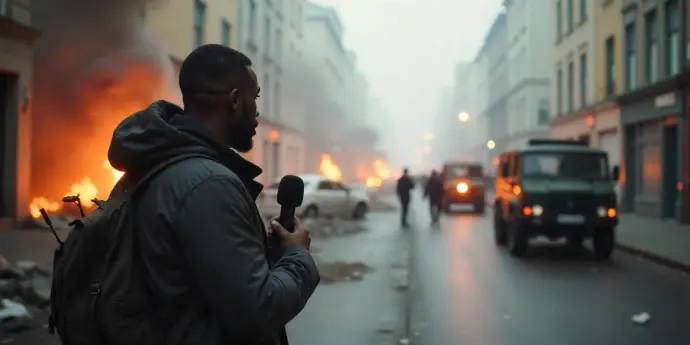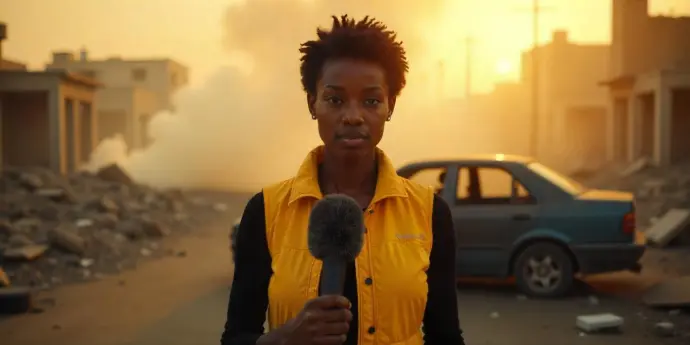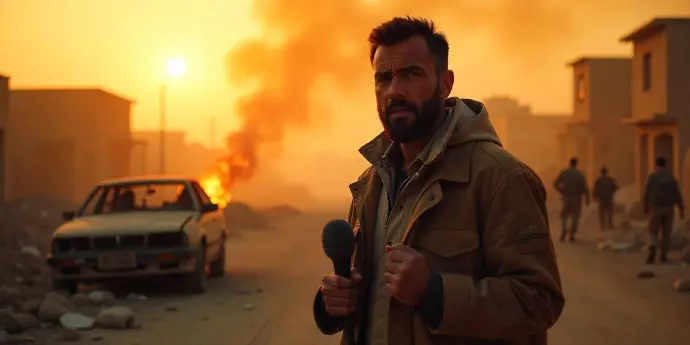
Attacks Against Journalists and War Reporters: Silencing the Truth
On our website, we delve into a comprehensive exploration and in-depth analysis of global human rights. In this feature article, "Attacks Against Journalists and War Reporters: Silencing the Truth," we unravel the shocking reality of attacks against journalists in conflict zones. Who is responsible? What are the consequences? Read on to discover more about this vital issue challenging press freedom today!
Introduction
In zones of armed conflict, the role of journalists and war reporters is fundamental in informing the world about the events and human rights violations occurring there. However, these professionals face numerous risks, including direct attacks, arbitrary detentions, and censorship, which significantly impact press freedom and the dissemination of the truth.
Journalists play a fundamental role in reporting on armed conflicts, as their work brings the violence, human rights violations, and war crimes occurring in these areas to the attention of international public opinion. Their courage in exposing themselves to situations of great danger to document the reality on the ground is essential for the exercise of press freedom and for access to accurate and timely information about armed conflicts around the world.
War reporters are often the only source of reliable, firsthand information on events occurring in conflict zones. Their work is vital to raising awareness among the international community about the situation and demanding concrete actions to protect the civilian population and stop human rights violations.
It is important to note that, in many cases, local journalists face the greatest risks, as they are the ones most familiar with the reality of the conflict and face reprisals from those involved in the conflict. Their valuable work of reporting and documentation often exposes them to constant danger.
Attacks against war journalists and reporters have a devastating impact on press freedom and access to truthful information about armed conflicts. These acts of violence create a chilling effect that seeks to silence the truth and hide the human rights violations committed there.
The intimidation, kidnapping, torture, and even murder of journalists in conflict zones aim to create a climate of fear that discourages other media professionals from reporting on the atrocities taking place there. This not only affects the work of journalists but also limits the public's access to accurate and complete information about the situation in their communities.
The impact of these attacks extends beyond the direct victims, as it affects society's ability to know the truth about armed conflicts and make informed decisions. Press freedom is seriously threatened when journalists are targeted by those involved in the conflict and subjected to attacks and reprisals.
It is essential to comprehensively address the human rights violations affecting journalists and war reporters in zones of armed conflict. Protecting journalistic work in these circumstances is crucial to guarantee access to accurate information and the reporting of war crimes, human rights violations, and other situations that require the attention of the international community.
Attacks against journalists not only violate press freedom but also represent an obstacle to the exercise of justice and accountability in contexts of armed conflict. Impunity in these cases perpetuates a cycle of violence and rights violations that must be addressed urgently and effectively.
The protection of journalists and war reporters, as well as demanding accountability for the attacks they suffer, are fundamental elements for the defense of human rights in armed conflict and for building a sustainable peace based on truth and justice.
Attacks Against Journalists and War Reporters
Journalists and war reporters face a wide range of attacks that seek to silence the truth and hinder their reporting. These attacks can range from intimidation and harassment to kidnapping, torture, and murder. The psychological impact of these attacks is significant, as journalists are forced to work in an environment of constant danger and threat, which affects their mental and emotional health.
Furthermore, physical attacks can result in serious injuries and even death, which not only affects the journalist in question but also sends a message of fear and repression to the entire journalistic community.
It is crucial to understand the severity of these attacks and to work on the protection and safety of journalists in their reporting work, as their work is fundamental to keeping society informed and ensuring transparency in conflict zones.
Reporters Without Borders reported that 54 journalists were killed, 550 imprisoned, and 55 kidnapped in 2024: "Record numbers." “Journalists don't die, they are killed; they are not in prison, regimes have locked them up; they have not disappeared, they have been kidnapped. These crimes, often orchestrated by governments or armed groups, are an affront to international law and too often go unpunished.
These alarming figures reflect the danger faced by war journalists in their quest to report and document the truth in situations of armed conflict. These statistics and cases exemplify the dire situation faced by war journalists and the importance of highlighting and condemning these attacks, as well as developing strategies for their protection and safety.
Reporters working in conflict zones face a series of challenges and risks, ranging from direct exposure to armed violence to a lack of access to accurate information and the constant threat of reprisals from armed groups and authoritarian governments.
The lack of effective protection by local authorities and the limited capacity of international organizations to guarantee the safety of journalists in these areas further exacerbate their vulnerability.
Furthermore, censorship and manipulation of information by conflict actors represent an additional challenge for reporters, who must overcome significant obstacles to bringing the truth to light.
In armed conflicts, journalists and war reporters play a fundamental role in informing the world about what is happening in conflict zones. However, this courageous work often puts them in grave danger, as conflict actors view the dissemination of the truth as a threat to their interests. Attacks against journalists in these situations not only seek to silence voices denouncing human rights abuses and violations, but also seek to obscure the reality of what is actually happening on the ground.
Censorship of the truth in armed conflicts is intensified by attacks on journalists, as these intimidating acts discourage other reporters from reporting on the situation in those areas. This creates an environment of fear and self-censorship, where journalists are forced to restrict their coverage for fear of reprisals. As a result, truthful and complete reporting on human rights violations and war crimes is compromised, hindering accountability and the pursuit of justice.
The relationship between attacks on journalists and censorship of the truth in armed conflicts is clear: these acts seek to undermine press freedom, hinder journalists' reporting, and keep hidden the atrocities that occur in the context of armed conflict. Addressing this issue is crucial to ensure that the truth prevails and that the work of journalists in risky situations is protected, allowing them to report freely and safely.
Consequences of Attacks on Society and Human Rights
Attacks against journalists and war reporters have a devastating impact on freedom of expression and access to information. When these professionals are attacked or silenced, it creates a chilling effect that inhibits other journalists and media outlets from reporting on critical situations and human rights violations. Self-censorship becomes more common, as fear of reprisals limits coverage of relevant events and reporting of abuses.
Furthermore, the general population is deprived of truthful and complete information, which makes it difficult to make informed decisions and understand the complexity of armed conflicts. Society loses its ability to know the truth and exercise criticism, which weakens democracy and fosters misinformation.
Ultimately, attacks against journalists and war reporters not only affect media professionals but also undermine the foundations of freedom of expression and access to information, fundamental rights for the healthy functioning of any democratic society.
Attacks against journalists and war reporters have a significant impact on the ability to report and expose human rights violations in contexts of armed conflict. These professionals play a crucial role in exposing abuses, documenting testimonies and evidence, and giving a voice to victims of conflict. When they are targeted or intimidated, their work of documentation and reporting is greatly hampered.
As a result, human rights violations can remain in the shadows, without the attention and pressure necessary for corrective action. The lack of media coverage and accurate reporting can also lead to a misperception of the situation on the ground, which in turn can delay or prevent humanitarian assistance and international intervention in crisis situations.
Attacks against journalists and war reporters have a direct impact on the visibility and reporting of human rights violations, perpetuating impunity and a lack of accountability in contexts of armed conflict.
Protection Measures and Response to Attacks
The work of journalists and war reporters is essential to informing the world about events in conflict zones; however, they are unfortunately often the targets of attacks and assaults. In response to this situation, various protection initiatives and protocols have been established to guarantee their safety and allow them to carry out their work safely and effectively.
These initiatives include specific safety measures for journalists in conflict zones, as well as the implementation of emergency response protocols. In addition, specialized safety training is promoted for journalists working in dangerous environments to prepare them to face risky situations and minimize the possibility of attacks.
It is essential that these protection measures be implemented and respected by all parties involved in an armed conflict, including governments, armed groups, and security forces, in order to guarantee the safety and freedom of expression of journalists in these situations.
In the face of increasing attacks against journalists in conflict zones, the international community has taken measures to guarantee the safety of media professionals. These actions include public condemnation of the attacks, diplomatic pressure on the governments and armed groups responsible, and promoting thorough investigations to bring the perpetrators to justice.
In addition, early warning and rapid response mechanisms have been established for emergency situations, as well as assistance and psychological support programs for journalists who have been victims of attacks or who have witnessed traumatic situations in the course of their work.
Solidarity and cooperation among countries and international organizations are essential to guarantee the safety of journalists in conflict zones and to send a clear message that attacks on press freedom will not be tolerated.
Impunity in cases of attacks against journalists is a serious problem that perpetuates violence and puts the safety of other media professionals at risk. It is essential that those responsible for these attacks be brought to justice and that the perpetrators be held accountable.
Justice and accountability are crucial to preventing future attacks against journalists and sending a clear message that attacks on press freedom will not go unpunished. Furthermore, reparations for victims and their families are crucial in the pursuit of justice in these cases.
Governments and the international community must commit to thoroughly investigating attacks against journalists, prosecuting those responsible, and ensuring the safety of media professionals in the exercise of their work.
Conclusions
The protection of journalists and war reporters remains an outstanding challenge in many armed conflicts around the world. Despite the efforts made by international organizations and governments, the vulnerability of these professionals to attacks and reprisals remains a constant concern.
It is essential that the international community intensify its efforts to guarantee the safety of journalists in conflict zones. This includes the implementation of more effective protection measures, as well as the prosecution of those who perpetrate attacks against journalists and war reporters.
The call for the protection of journalists in armed conflict must be a priority on the global agenda, as their work is vital for accessing accurate information and denouncing human rights violations in conflict situations.

 IHRO NEWS
IHRO NEWS

